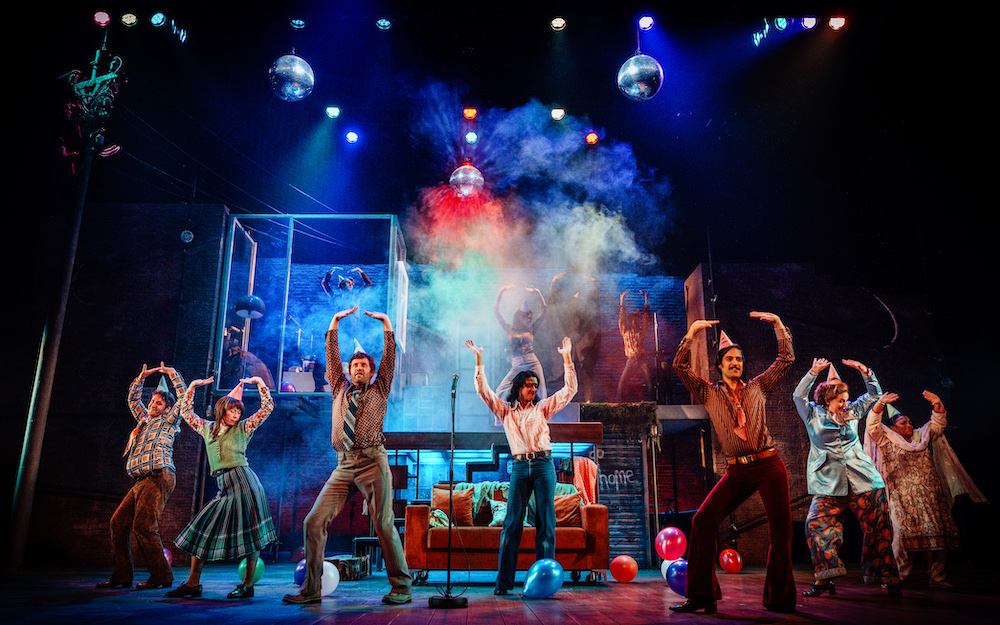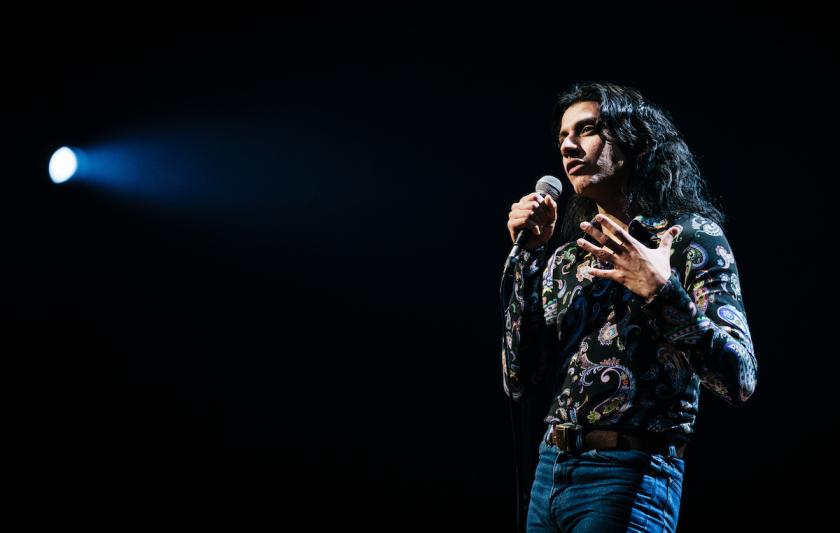Hanif Kureishi’s 1990 novel The Buddha of Suburbia begins like this: “My name is Karim Amir, and I am an Englishman born and bred, almost”. Almost. Yes, that's good. We are in 1970s south-east London, and this immediately introduces, despite its tentative tone, the protagonist as a young man trying to define his identity.
Like the original book, this stage adaptation — by director Emma Rice with help from Kureishi — explores the tensions between East and West, Buddhism and Islam, suburb and city, glam rock and punk, gay and straight, with some of the characters adopting fake identities as well as true ones. In fact, Kureishi suggests that only by pretending to assume an identity can you really embrace a new persona.
Which is exactly what Karim does. Starting off as a teenager in his suburban home, living with his Mumbai-born Muslim father Haroon and white mother Margaret, he watches as his dad begins a passionate affair with the bohemian Eva; at the same time, Karim becomes infatuated with her son Charlie. Meanwhile, as a refuge from family tensions, he hangs out with Jamila, daughter of Haroon’s best friend Anwar, whose wife Jeeta runs a corner shop. When Anwar insists on Jamila marrying Changez, an arranged marriage, Karim struggles to help her, but soon befriends her husband, while trying to make a career as an actor. Phew.
Falling under the spell of director Matthew Pyke, a paragon of 1970s alternative theatre, Karim comes of age through his first love affair with Eleanor, an actor in Pyke’s company. During rehearsals, Pyke expounds his paradoxical gospel: acting, to be truthful, is the construction of an untrue self — the true self comes from the untrue one. So Karim must perform stereotypical Indian characters in his quest to find his real self, just as Haroon the Muslim pretends to be a Buddhist guru to please white suburbanites. Similarly, Charlie assumes the identity of a punk rocker, Jamila acts out the role of an Indian Angela Davis, and Changez plays the part of an English gent, a fan boy follower of Sherlock Holmes.  Of course, Rice’s theatrical adaptation plays games with these performances of identity, and this playful stage version follows the story arc of Kureishi’s novel. Because of the original’s multitude of incidents, this version needs a narrator so Karim is centre-stage for most of the play’s three-hour running time, filling us in on the back stories of the characters and bringing us up-to-date on new developments. As a stage presence, played by the charismatic Dee Ahluwalia, he is always charming, often ironic and sometimes angry. But while the humour of the novel, which also has a lot to say about race and class, is well represented, the more serious aspects of the original tend to get lost.
Of course, Rice’s theatrical adaptation plays games with these performances of identity, and this playful stage version follows the story arc of Kureishi’s novel. Because of the original’s multitude of incidents, this version needs a narrator so Karim is centre-stage for most of the play’s three-hour running time, filling us in on the back stories of the characters and bringing us up-to-date on new developments. As a stage presence, played by the charismatic Dee Ahluwalia, he is always charming, often ironic and sometimes angry. But while the humour of the novel, which also has a lot to say about race and class, is well represented, the more serious aspects of the original tend to get lost.
Rice, who directs the show, makes Eleanor, a middle-class young woman who suffers from depression, into a comic caricature, who flaps around the stage in a funny farcical way, which is entertaining and mocks bourgeois pretentions, but at the same time undermines, and makes a nonsense of, Karim’s ardent love for her. A couple of throwaway lines from the novel about her once working with a performance artist (satirical reference to Carolee Schneemann) who extracted the texts of poems from her vagina here gets a cameo moment. It’s fun, but also emphasizes the unserious nature of the whole evening. Everything here is a laugh: class power, hah ha; cultural power, ha ha; racism, ha ha; activism, ha ha; casual sex, ha ha.
Gradually, as the play grinds on, this insistence on comedy at all costs becomes wearisome. Like a person who cracks jokes compulsively to avoid saying anything serious, it soon irritates. So while the flamboyant theatricality of the show, which features 1970s pop and rock classics such as the Bee Gees’s “Tragedy” and Velvet Underground’s “Venus in Furs”, and many, too many, dance numbers (pictured above) — along with flapping pigeons and a beautiful show-stopping fox puppet — is great fun, the whole thing has a hectic quality that rapidly gets tiring. The best comic scenes, such as Pyke’s rehearsal routines, are wonderfully satirical, but they do overwhelm the serious content.
Anyway, Rice does a good job in deleting a dozen marginal characters from the story, and squeezing the decade date range of the original into three years. The scenes you remember include Pyke’s throbbing banana orgy, during which his wife seduces Karim while Pyke pleasures Eleanor, Haroon’s meditation session in which the actor Ankur Bahl demonstrates his amazing physical flexibility and control, and, for a change, a genuinely dark episode when Karim is reunited with Charlie in a decadent New York. The relationship between Karim and Jamila is one of the few which gets the room to breathe, while Anwar’s descent into angry disappointment also works well. But the threat from National Front violence gets more of an airing in the programme notes than on the stage.
A co-production between the RSC and Rice’s Wise Children company, the play now visits the Barbican Theatre, a good location for Rachana Jadhav’s multi-tiered set, which layers bedrooms over living rooms next to gardens and the street. Vicki Mortimer’s bright 1970s retro costumes add to the show’s humour, and the acting — despite Rice’s compulsive comic exaggerations — is uniformly good. As well as Ahluwalia’s Karim and Bahl’s Haroon, high points are Natasha Jayetileke’s Jamila and Ewan Wardrop’s Pyke, while there is also good work by Naveed Khan (Anwar), Simon Rivers (Changez) and Katy Owen, who plays both Eleanor and Karim’s mother (very Oedipal). Together they make the sex and drugs fruity, the family dynamics warmly appealing, and the novel relevant to a new generation — but losses include much of its politics and most of its serious edge.















Add comment